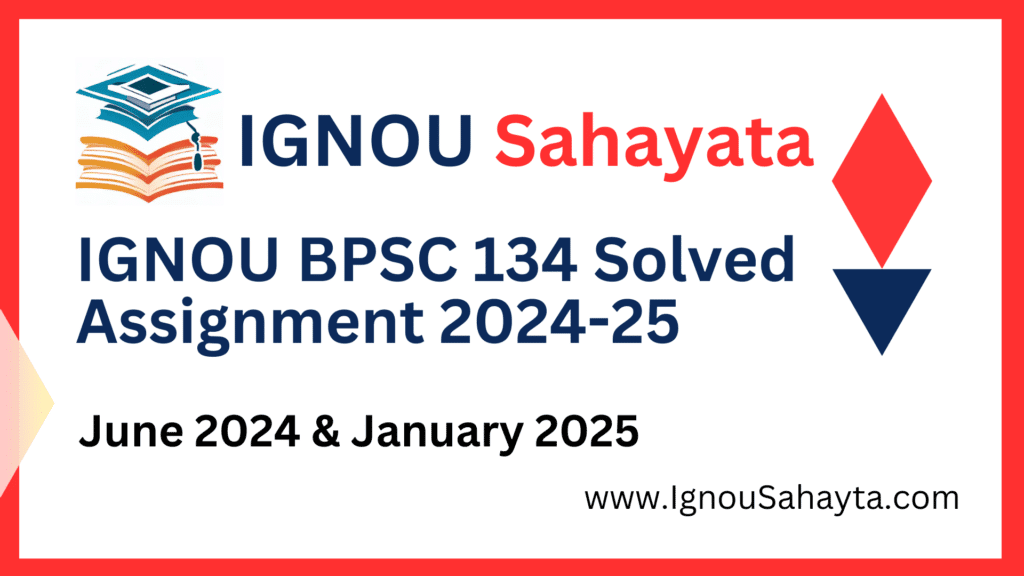Presenting the most recent update to our collection of IGNOU BPSC 134 Solved Assignment 2024–25 PDF Download resources! You are at the correct location if you are enrolled in the BPSC 134 course for the Indira Gandhi National Open University (IGNOU) Bachelor of Arts (General) program. English and Hindi-language assignments are available from us. You may approach the problems this course presents with confidence and accuracy if you use this painstakingly created Solved Assignment PDF.

We explore the fundamental ideas, assignments, and concepts that underpin this course as we delve into the details of IGNOU BPSC 134 in this extensive guide. Our Solved Assignment PDF offers thorough answers and insights to any problems you may be having with challenging subjects or looking for clarification on assignment criteria.
The IGNOU BPSC 134 Solved Assignment 2024–25 PDF Download gives you access to professionally written answers that meet IGNOU requirements. Bid farewell to ambiguity and doubt and welcome to a methodical approach to learning your content and succeeding in your academic endeavors.
Also Read : IGNOU BPSC 132 Solved Assignment 2024-25 PDF Download
Click To Download Full IGNOU BPSC 134 Solved Assignment
BPSC 134 Solved Assignment 2024-25 Hindi Medium
BPSC 134 Solved Assignment 2024-25 English Medium
IGNOU BPSC 134 Solved Assignment 2024-25
IGNOU BPSC 134 Solved Assignment 2024–2025: International Relations (IR) is a branch of political science that studies the interactions between countries, as well as the roles of sovereign states, international organizations, non-governmental organizations, and multinational corporations. The field of IR emerged in the aftermath of World War I, as scholars sought to understand the causes of conflict and the conditions necessary for peace. Over time, the study of international relations has expanded to include a wide range of issues, such as global security, trade, diplomacy, human rights, and environmental concerns. The discipline provides a framework for analyzing how global actors interact, cooperate, and conflict with one another in an increasingly interconnected world.
One of the core concepts in international relations is the notion of sovereignty, which refers to the authority of a state to govern itself without external interference. The Westphalian system, established in 1648, is often cited as the foundation of the modern international order, where sovereign states are the primary actors. However, in the contemporary world, the principle of sovereignty is often challenged by globalization, international institutions, and transnational issues that require collective action. This has led to debates about the balance between state sovereignty and the need for international cooperation to address global challenges like climate change, terrorism, and pandemics.
Theories of international relations play a crucial role in understanding and predicting the behavior of global actors. Realism, one of the oldest and most influential IR theories, emphasizes the role of power and national interest in shaping state behavior. Realists argue that the international system is anarchic, meaning that there is no overarching authority above states, leading to a self-help system where states prioritize their own survival and security. In contrast, liberalism highlights the potential for cooperation among states through institutions, trade, and democratic governance, arguing that interdependence can lead to more peaceful and stable international relations. Other theories, such as constructivism, focus on the importance of ideas, norms, and identities in shaping international interactions.
Diplomacy and international organizations are vital tools in the practice of international relations. Diplomacy involves the negotiation and communication between states to manage conflicts, build alliances, and advance national interests. International organizations, such as the United Nations, World Trade Organization, and International Monetary Fund, provide platforms for cooperation, set rules for global governance, and address issues that transcend national borders. These institutions play a crucial role in maintaining international peace and security, promoting economic development, and upholding human rights. However, their effectiveness is often debated, particularly in cases where the interests of powerful states conflict with global norms.
In conclusion, the study of international relations is essential for understanding the complexities of global interactions and the factors that influence the behavior of states and other international actors. As the world becomes more interconnected, the challenges facing the international community require collaborative solutions that transcend national boundaries. Theories and practices of international relations provide the tools to analyze these challenges, predict outcomes, and formulate policies that promote peace, security, and prosperity on a global scale. Understanding international relations is not only crucial for policymakers but also for informed global citizens who wish to engage with the world around them.